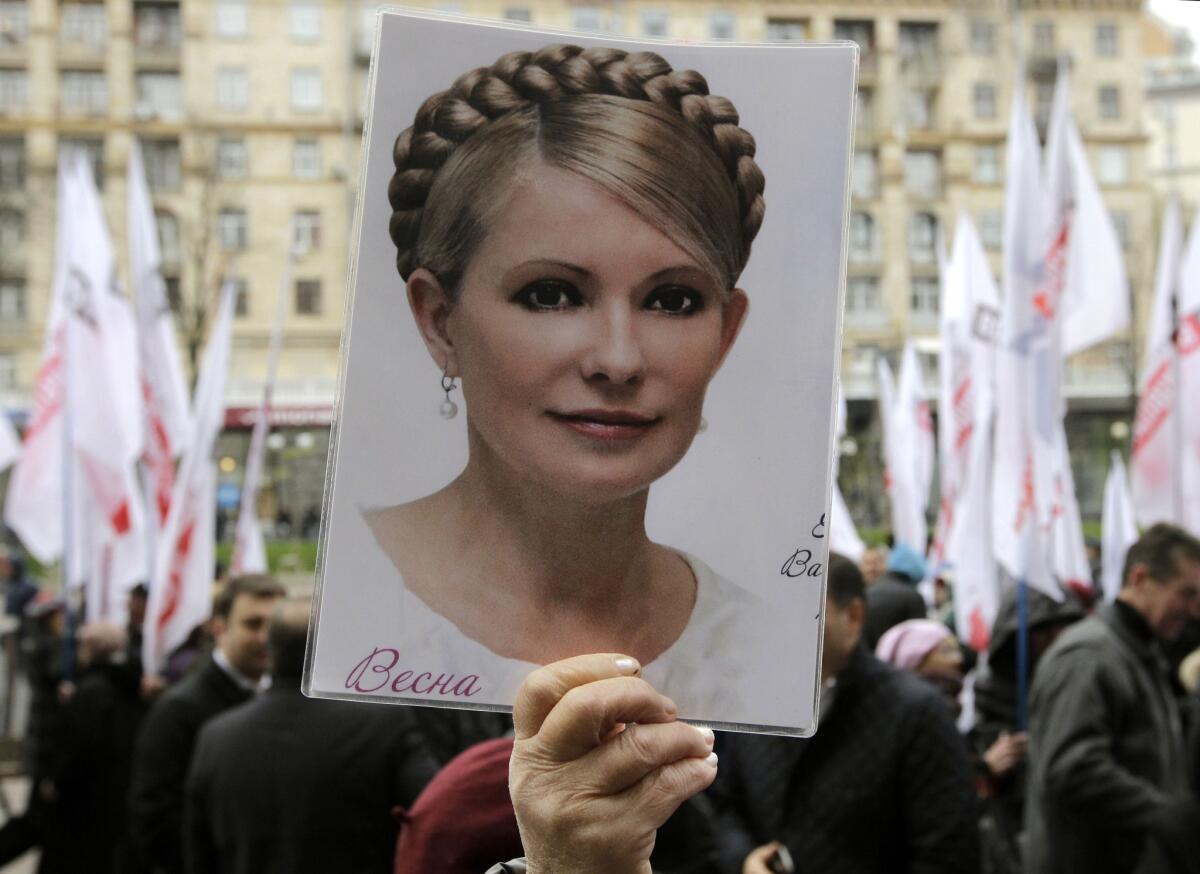Ukraine bows to Russian pressure, suspends EU entry bid

Ukraine announced Thursday that it was suspending its bid to join the European Union in favor of working toward better trade ties with Russia, a sign of the Kremlin’s success in keeping a former Soviet republic within its political orbit.
Prime Minister Mykola Azarov said his government made the decision to turn East rather than West “with the aim of adopting measures to ensure national security.”
The statement followed the Ukrainian parliament’s rejection earlier Thursday of six different measures that would have let jailed opposition leader Yulia Tymoshenko leave the country for medical treatment abroad. Freeing the charismatic leader of Ukraine’s Orange Revolution would go far toward meeting the EU membership condition that Ukraine cease practicing “selective justice.”
Tymoshenko, 52, was sentenced two years ago to seven years’ imprisonment for corruption and misuse of office in committing Ukraine to an expensive gas deal with Russia.
EU officials negotiating Ukraine’s entry to the 28-member bloc have criticized her prosecution as politically motivated. Tymoshenko, leader of the main opposition party Fatherland, twice served as prime minister during the last decade and has already been nominated by a united opposition alliance to run for president in 2015.
Tymoshenko narrowly lost the 2010 presidential race to Viktor Yanukovych, and supporters have cast her prosecution and imprisonment as a campaign by the current president to subvert his strongest competition.
Yanukovych’s Regions Party controls parliament, where the measures to let Tymoshenko go to Germany for treatment of a spinal disc herniation were soundly defeated.
“It is President Viktor Yanukovych who is personally blocking Ukraine’s movement toward the European Union,” Fatherland parliamentary leader Arseniy Yatsenyuk told parliament after the vote, according to news agencies covering the session.
EU membership has been a divisive issue in Ukraine, as Russian President Vladimir Putin portrays his former ally’s drift westward as a betrayal and has made veiled threats to cut the natural gas exports that supply 60% of Ukraine’s needs.
Analysts speculated that Yanukovych might have shelved the EU membership quest in an attempt to force the influential Western bloc to offer more support should Russia retaliate by cutting off vital energy shipments.
“It could be a tactical move, but the way he’s playing it is more likely to be long-term,” said F. Stephen Larrabee, a distinguished scholar in European Security at Rand Corp. He said the Ukrainian president “just doesn’t get it” about the EU’s commitment to human rights and the rule of law, pointing to the jailing of Tymoshenko as an obstacle to membership over which the Western democracies will never compromise.
German Foreign Minister Guido Westerwelle observed after Ukraine’s decision to shelve its EU bid that Kiev authorities still had time to reconsider before a key gathering of bloc leaders in Vilnius, Lithuania, late next week.
“The ball is in Ukraine’s court,” Westerwelle said in a statement. “It is her sovereign right to freely decide her path.”
The U.S. State Department issued a statement saying the Obama administration “joins the European Union in its disappointment” that Ukraine was opting to drop the quest for closer EU ties.
Former Polish President Aleksander Kwasniewski told his nation’s TVN24 that Yanukovych buckled under “unprecedented pressure” from Moscow. Kwasniewski has served as one of the EU intermediaries with Ukraine on the reforms needed before it can join the bloc.
Yanukovych had been expected to sign a trade agreement with the EU at the Nov. 28-29 summit in Vilnius. The government’s signal that it will instead expand trade and ties with Russia and other former Soviet republics was met with obvious pleasure in Moscow.
Alexei Pushkov, head of the lower house of parliament’s foreign affairs committee, called the EU demand for Tymoshenko’s release “a mine” that blew up any chance of expansion to Ukraine.
Dmitry Peskov, Putin’s press secretary, called Ukraine’s about-face on EU membership “a strictly internal and sovereign decision” by Kiev, the Interfax news agency reported.
But Peskov said Putin stood ready to convene “tripartite negotiations” among the EU, Russia and Ukraine on trade and economic cooperation, an approach that appears to reflect the Kremlin’s desire to keep Ukraine tethered to an Eastern alliance directed from Moscow.
ALSO:
Iran appears to stiffen demands at nuclear talks
Agency seeks private help in destroying Syrian chemical arms
Karzai says he might leave it to successor to sign U.S. accord
A foreign correspondent for 25 years, Carol J. Williams traveled to and reported from more than 80 countries in Europe, Asia, the Middle East and Latin America.
More to Read
Sign up for Essential California
The most important California stories and recommendations in your inbox every morning.
You may occasionally receive promotional content from the Los Angeles Times.











